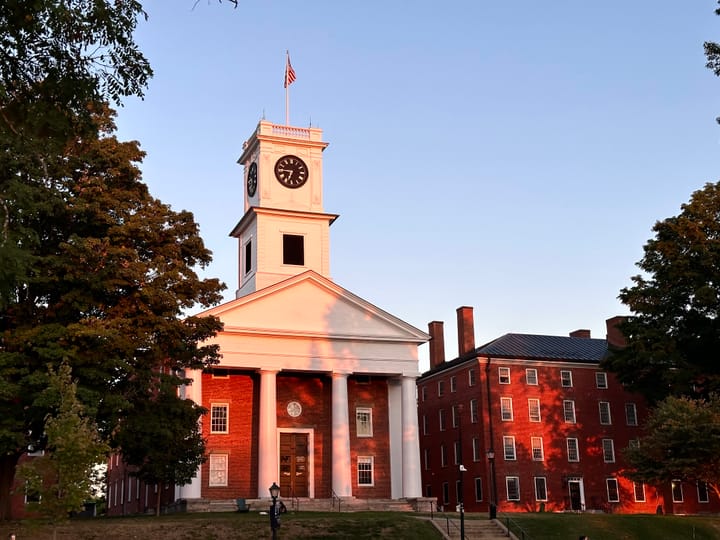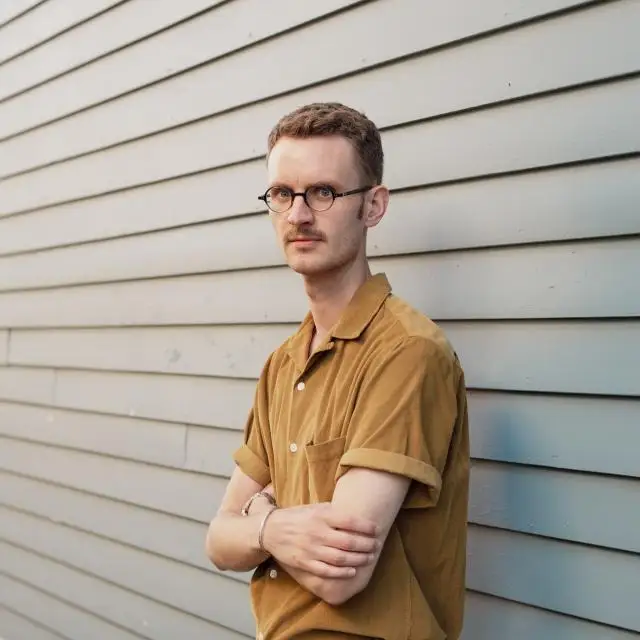Cashion's determination pays off
“Winn is the quintessential liberal arts student. He has a passion for so many things: words, books, cycling, Spain, its language and people, as well as chemistry,” said Professor of Chemistry David Hansen. “He is also a marvelous person, extremely kind and caring.”
Posing a triple threat
Cashion came to the College fairly sure that he wanted to major in math; however, at Amherst, he discovered two other subjects in which he also wanted to major. “I always knew I wanted to study math in college. The logic and elegance of math appeal to me,” he explained. “Because I was also fairly sure that I wanted to go to medical school, I ended up taking many chemistry courses.”
Cashion will no doubt use the knowledge gained from both of those majors while a graduate student at Emory University. “I will be enrolling in the M.D./Ph.D. program at Emory University in Atlanta,” he said. “I intend to earn a Ph.D. in organic chemistry, perhaps focusing on the use of organic synthesis in drug development. After a medical residency, I hope to practice medicine and conduct research.”
While chemistry and math are understandable majors for a future medical student, it was Cashion’s desire for academic diversity and his passion for particular Spanish exports which contributed to his decision to major in Spanish. “While I love science and math, too much of a good thing can be overwhelming. I had taken Spanish for a number of years in middle and high school and decided to continue with it in college,” he said. “Spanish was a very welcome respite from the equations and reaction mechanisms of the other courses. I quickly realized how interested I am in language itself. When you couple this with my fondness for all things Spanish-Spanish music, Spanish soccer, Spain itself-majoring in Spanish was a natural choice.”
The process of learning
Cashion’s interests led him to remain on campus during the summer after his freshman year; he conducted research with Professor of Chemistry Helen Leung. “I was fortunate enough to receive a Hughes Scholarship with Professor Leung in the summer after freshman year,” he said. “I used microwave spectroscopy to study rotational transitions of van der Waals dimers in her lab.”
In addition to the Hughes Scholarship, Cashion was awarded the Amherst College 2004 White Award in Chemistry, and he was one of four College students to be nominated for the Barry M. Goldwater Scholarship.
Cashion enjoyed his summer at the College and decided to stay again after his sophomore year. “I think both the campus and town are quite pleasant during the summer, although there is not always too much to do,” he said. “My only real complaint was the weather, which I thought was far too cool. I’m from just outside Kansas City, where the temperature is often above 100. Although such weather might seem quite oppressive, you quickly acclimate yourself and come to tolerate it, if not necessarily enjoy it. Thus, Amherst, with highs in the 80s, seemed uncomfortably cool.”
The research experience he gained helped Cashion decide to write a thesis in chemistry, with Leung as his advisor. “My thesis used a method called Fourier Transform microwave spectroscopy to study what are known as van der Waals dimers. Such dimers are ubiquitous and very important in chemistry and biology,” he explained. “The process of conducting research can be frustrating at times. Nevertheless, it is quite exhilarating when you feel you are making progress. In particular, I think that perseverance and patience are perhaps the two most important personal qualities that a thesis writer must have or learn along the way.”
While his academic accomplishments are indisputable, Professor of Spanish James Maraniss said that Cashion’s kind personality leads him to develop admirable relationships with classmates and pets alike. “He comes to my office, to see me, maybe, but really to see my dog, Fannie, who shoots out of her bed when she hears him. He’s her favorite, because of some unassuming, unconditional, appreciative quality he has. Surely his classmates have seen this,” Maraniss said. “At the senior dinner I saw him hanging with [a diverse group of] students, and I wondered what they saw in him, because he’s not smooth at all. Then I thought, of course, they like him for the kind of purity he has, nothing hidden, a comrade.”





Comments ()